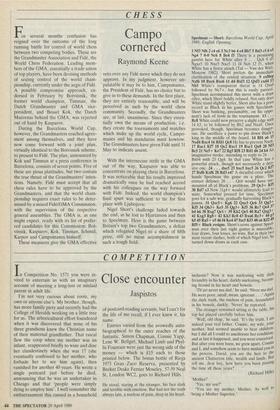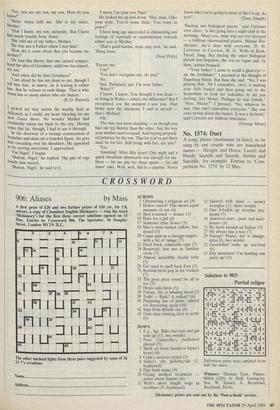COMPETITION
Close encounter
Jaspistos
In Competition No. 1571 you were in- vited to entertain us with an imaginary account of meeting a long-lost or mislaid parent in adult life.
I'm not very curious about roots, my own or anyone else's. My brother, though, has more family piety and recently had the College of Heralds working on a little tree for us. The arboricultural effort foundered when it was discovered that none of his three grandsons knew the Christian name of their maternal grandfather. That rascal flew the coop when my mother was an infant, reappeared briefly to wine and dine her clandestinely when she was 17 (she eventually confessed to her mother, who forbade her to see him again), then vanished for another 40 years. He wrote a single postcard just before he died, announcing that he was an undertaker in Chicago and that 'people were simply dying to employ him'. I well remember the embarrassment this caused in a household
of postcard-reading servants, but! can't for the life of me recall, if I ever knew it, his name.
Entries varied from the avowedly auto- biographical to the outer reaches of the fantastic. Simon Chapman, Connie Yapp, Lene W. Bellgirl, Michael Limb and Phyl- lis Fountain were just the wrong side of the money — which is £15 each to those printed below. The bonus bottle of Rioja 1973 Gran Zaco Reserva, presented by Becket Drake Ferrier Moseley, 57-59 Neal St, London WC2, goes to Richard Hills.
He stood, staring at the stranger, his face dark and terrible with emotion. But had not the truth always lain, a nucleus of pain, deep in his heart,
inchoate? Now it was nucleating with dark fecundity in his heart, darkly nucleating, becom- ing fecund in his heart and bowels.
'Th'art never ma dad,' he said. IsTiver ma clad.
He were poor, small, mean, ignorant. Again the dark truth, the nucleus of pain, fecundated in his bowels, darkly. 'Never' he repeated. The stranger remained sitting at the table, his top hat placed carefully before him.
`Well, old chap,' he said. It's the truth. I am indeed your real father. Connie, my wife, your mother, had seemed unable to bear children; but did all I could to ameliorate her condition, and at last it happened, and you were conceived: But after you were born, we grew apart, Connie and I, and somehow seem to have mislaid you la the process. David, you are the heir to the ancient Chatterton title, wealth and lands. But tell me, dear boy, how have you been passing the time all these years? . .
`Mother!'
'Yes, my son?' `You are my mother, Mother. As well as being a Mother Superior.' (Richard Hills) 'Yes, you are my son, my son. How do you know?'
'Sister Anna told me. She is my sister, Mother.'
That I knew, my son, naturally. But I have had much trouble from Anna.'
'She told me of my father, Mother.' 'He was not a Father when I met him.'
'How did it come about that you became my mother?'
'He had this theory that one cannot compre- hend the idea of Goodness, until one has sinned, my son.'
'And when did he find Goodness?'
'I am afraid he has not done so yet, though I tell him that, at ninety, he is leaving it rather late. But he refuses to rush things. That is why Anna has so many sisters who are Sisters.' (E.O. Parrott) I picked my way across the muddy field as delicately as I could, my heart bleeding for my new Gucci shoes. No wonder Mother had eventually taken me back to the city. Having come this far, though, I had to see it through. In the doorway of a strange construction of branches and skins sat a bearded figure, his grey hair cascading over his shoulders. He appeared to be carving moccasins. I approached. 'I'm Nigel,' I began. 'Shalom, Nigel,' he replied. The pile of rags beside him stirred.
'Sharon, Nigel,' he said to it. 'I mean I'm your son Nigel.'
He looked me up and down. 'Hey, man, I like your style. You're some dude. You come in peace?'
'I have long ago succeeded in eliminating any feelings of reproach or recrimination towards either you or Mother.'
'That's good karma, man: stay cool,' he said. 'Hang loose.'
(Noel Petty) 'Excuse me.'
'Urn?'
'You don't recognise me, do you?'
`No.'
'Sad. Definitely sad. I'm your father.' 'What??'
'I know, I know. You thought I was dead — or living in Wales — what's the difference? But I recognised you the moment I saw you. That bloke near the checkout, I said to myself — that's Michael.'
`Oh.'
'The way you were standing — as though you had one leg shorter than the other. Just the way your mother used to stand. And buying prepack- ed potatoes by the ton. That lot you've got there must be for her. Still living with her, are you?'
'Yes.'
'Amazing! After fifty years! One night and a quick breakfast afterwards was enough for me. Here — let me pay for those spuds — for old times' sake. Well, well, this is a surprise. Never know who you're going to meet at the Co-op, do you?' (Tony Joseph) 'Finding one biological parent,' said Carstairs over claret, 'is like going into a night-club in the morning. Mind you, mine was not too decayed — a brilliant international pianist, Minnie Bol- sheimer; she'd slept with everyone, D. H. Lawrence in Croydon, H. G. Wells in Kent, Freud, Jung. But finding the other biological parent was hopeless; she was so vague and, by then, scatter-brained.
—Your father? I seem to recall a glass-eye — ah, the Archduke!" I preened at the thought of Hapsburg blood. But then she said, "No, I was playing that. All I remember, cheri, is making your little basket and then going out to the Serpentine to look for bulrushes to set you drifting, like Moses. Perhaps he was Jewish." "Who, Moses?" I pressed. "No, whoever he was. One can't remember everyone." She was even wrong about the basket. It was a tin bowl,' said Carstairs not without bitterness.
(George Moor)



















































 Previous page
Previous page